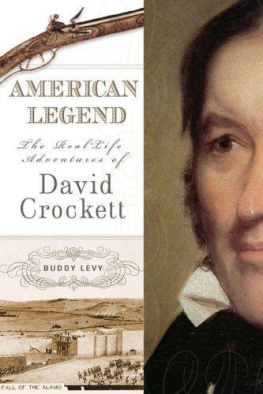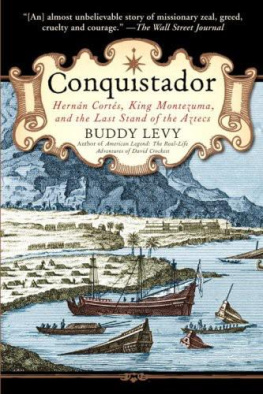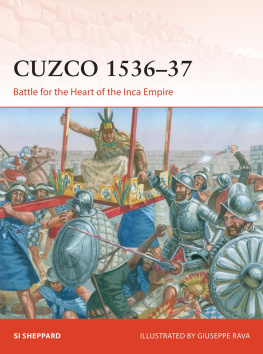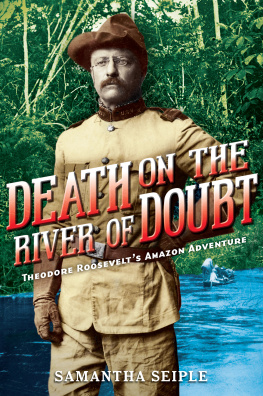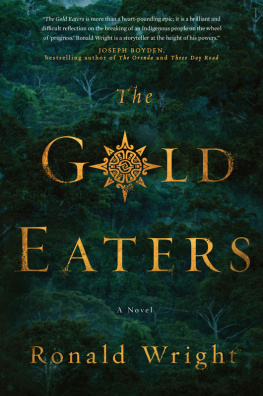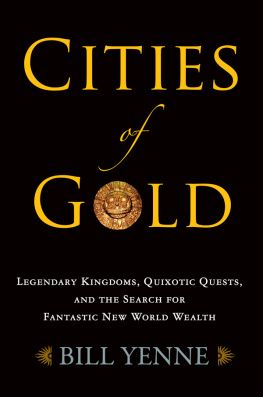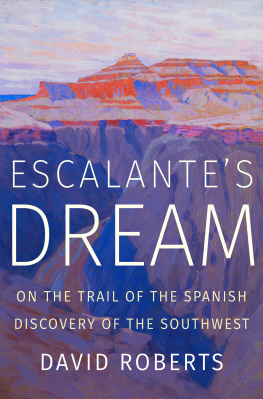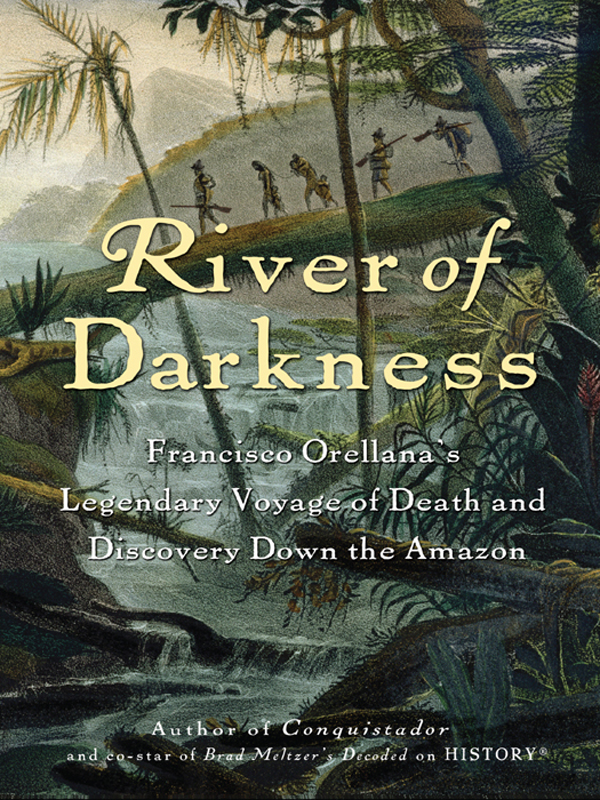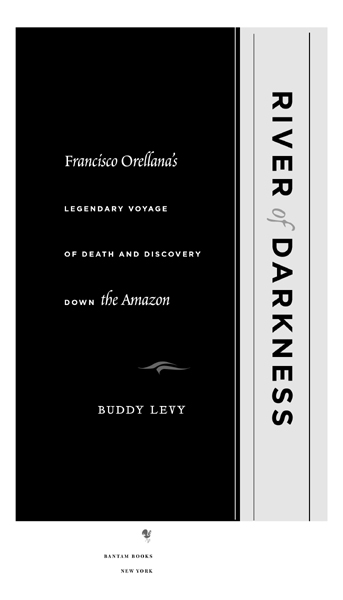ALSO BY BUDDY LEVY
CONQUISTADOR:
Hernn Corts, King Montezuma, and
the Last Stand of the Aztecs
AMERICAN LEGEND:
The Real-Life Adventures of David Crockett
ECHOES ON RIMROCK:
In Pursuit of the Chukar Partridge
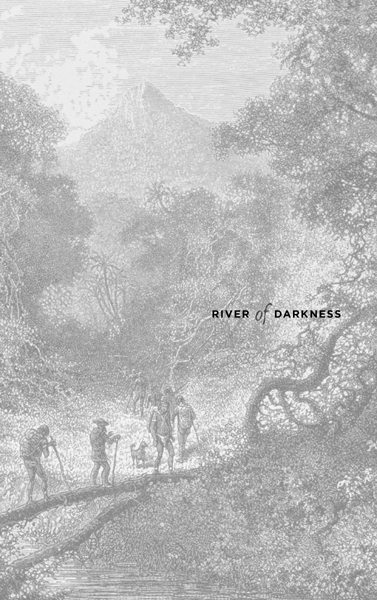
Copyright 2011 by Buddy Levy
All rights reserved.
Published in the United States by Bantam Books, an imprint of The Random House Publishing Group, a division of Random House, Inc., New York.
B ANTAM B OOKS and the rooster colophon are registered trademarks of Random House, Inc.
LIBRARY OF CONGRESS CATALOGING-IN-PUBLICATION DATA
Levy, Buddy.
River of darkness: Francisco Orellanas legendary voyage of death and discovery down the Amazon / Buddy Levy
p. cm.
eISBN: 978-0-553-90810-7
1. Orellana, Francisco de, d. ca. 1546. 2. Amazon River Region
Discovery and explorationSpanish. I. Title.
E125.O6 L48 2011 2010041849
981/.01 22
Map copyright 2011 by David Lindroth
www.bantamdell.com
Jacket design: Tom McKeveny
Jacket illustration: color lithograph after Jean-Baptiste Debret, Indians Using a Fallen Tree-Trunk to Cross the Rio Paraiba do Sul, from Voyage Pittoresque et Historique au Brsil (Bibliothque Sainte-Genevive, Paris/Archives Charmet/ Bridgeman Art Library International)
v3.1_r1
For my father, Buck Levy,
who first took me to the river
We seldom or never find any nation hath endured so many misadventures and miseries as the Spaniards have done in their Indian discoveries. Yet persisting in their enterprises, with invincible constancy, they have annexed to their kingdom so many goodly provinces, as bury the remembrance of all dangers past. Many years have passed over some of their heads in search of not so many leagues: Yea, more than one or two have spent their labour, their wealth, and their lives, in search of a golden kingdom, without getting further notice of it than what they had at their first setting forth.
S IR W ALTER R ALEIGH , The History of the World, 1614
There is something in a tropical forest akin to the ocean in its effect on the mind. Man feels so completely his insignificance there and the vastness of nature.
H ENRY W ALTER B ATES , The Naturalist on the River Amazons, 1892
In human terms, Francisco Orellanas is probably the most compelling narrative from the entire conquistador period, for the simple reason that this time it was the Europeans who suffered so desperately, and who needed all their powers of endurance as they battled with a savage environment.
P ETER W HITFIELD , Newfound Lands
CONTENTS
19 The Expedition to New Andalusia
Return to the Amazon
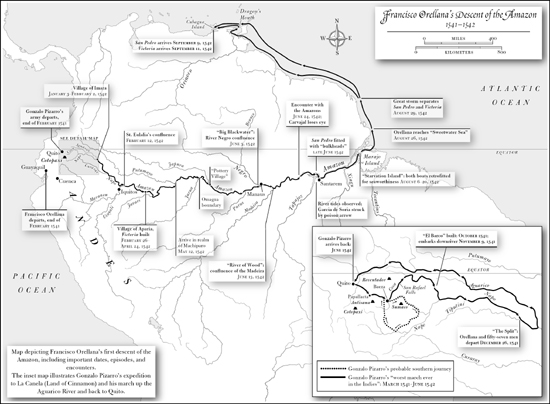
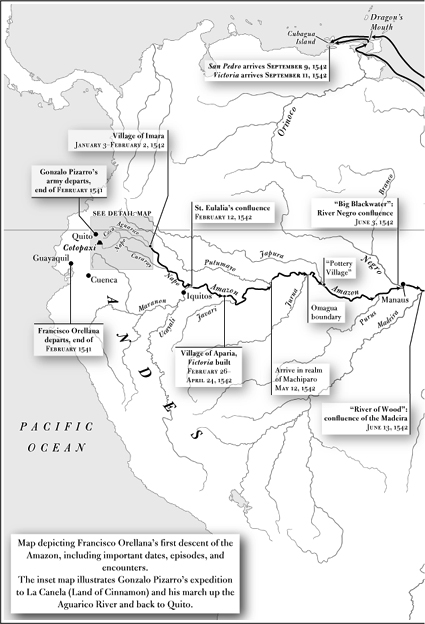
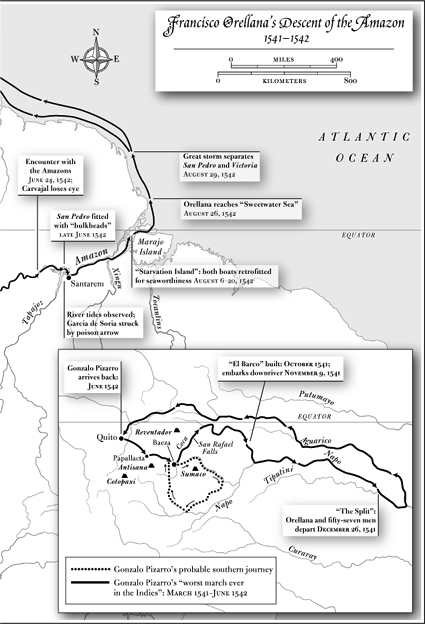
PROLOGUE
Christmas Day, 1541
C ONQUISTADOR FRANCISCO ORELLANA STOOD ON the sodden riverbank and regarded the ceaseless roil of the river, uncertain where the dark waters were heading. In the dying light the water appeared black as it slithered downstream, moving like the skin of some gargantuan dark snake disappearing into an endless jungle. Orellana turned and beheld his bedraggled troops. Some, starving and feverish, their clothes rotted to soiled rags, bent before a weak fire, boiling leather straps from their saddle girths into a bitter broth. Others lay moaning beneath makeshift shelters of palm fronds and ceiba tree bark, their skin sickly white, riddled with bites and stings from mosquitoes, army ants, wasps, and vampire bats. Behind them, from the impenetrable lowland rain forest, sounded the ominous, lionlike roars of red howler monkeys and the piercing calls of macaws.
It was not supposed to be this way. Orellana had fantasized about being fabulously rich by now. He had dreamed, along with his captain Gonzalo Pizarro, of being among the wealthiest men in the world.
Now, all around them was nothing but an infinite river that delivered only death and despair and darkness.
Ten months before, in February, the Spaniards had trekked from Quito over the massive Andes in search of the Land of Cinnamon and the fabled riches of El Dorado, the gilded man who, legend held, was daily powdered from head to toe with gold dust, which he would then wash from himself in a lake whose silty bottom was now covered with gold dust and the golden trinkets tossed in as sacrificial offerings.
But the golden dream had proved an unspeakable nightmare. Now, staring at his writhing, starving men, Orellana thought only about how he might get them all out of this death trap alive.
Getting here had nearly killed them. For months they had hacked their way through the dense Andean forests, the forbidding snowcapped Antisana volcano erupting in the distance, rumbling the earth with great quakes and sending shock waves of fear through the exhausted men as the roofs of the abandoned Indian huts they took shelter in collapsed upon them. On their descent from the mountains, rains slashed the hillsides in horrific torrents, sending the men scurrying to higher ground to escape flash floods and engorging the streams so that the conquistadors were forced to cut timber and construct bridges in order to continue forward. The Spaniards suffered attacks by small bands of Indians at the headwaters of the upper Coca and Napo rivers, and all of their native slaves, porters, and guides either died on the freezing mountain passes or fled during the long nights.
The conquistadors had eaten nearly all of the two hundred horses they had brought with them, abandoning others in the dense and roadless forests, which proved impassable for the large animals. Eaten, too, were all of the savage mastiffs and wolfhounds trained to terrorize native populations or to take part in battle. Francisco Orellana, his despondent captain Gonzalo Pizarro, and their few hundred mercenary soldiers were lost in an unknown wilderness, slowly starving to death with scant hope for survival. Progress along the rivers dank and decaying shoreline was disastrous. Forlorn, they came to understand that somehow the river must be their only hope for salvation.
So they built a boat, salvaging iron from the shoes of slain horses to fabricate nails, calking the craft with cotton ripped from their own garments and blankets, constructing cordage from tree vines.
Pizarro, glowering and brooding and violent, tortured some captured Indians for information, learning between their screams that perhaps two days travel downriver was a prosperous village boasting large manioc plantations, enough to keep the men alive, at least for a time.
Francisco Orellana watched the slow and languid movement of the murky river. The waterway appeared hostile and forbidding and alien to him, but he knew what he must do: in this open boat, dubbed the


